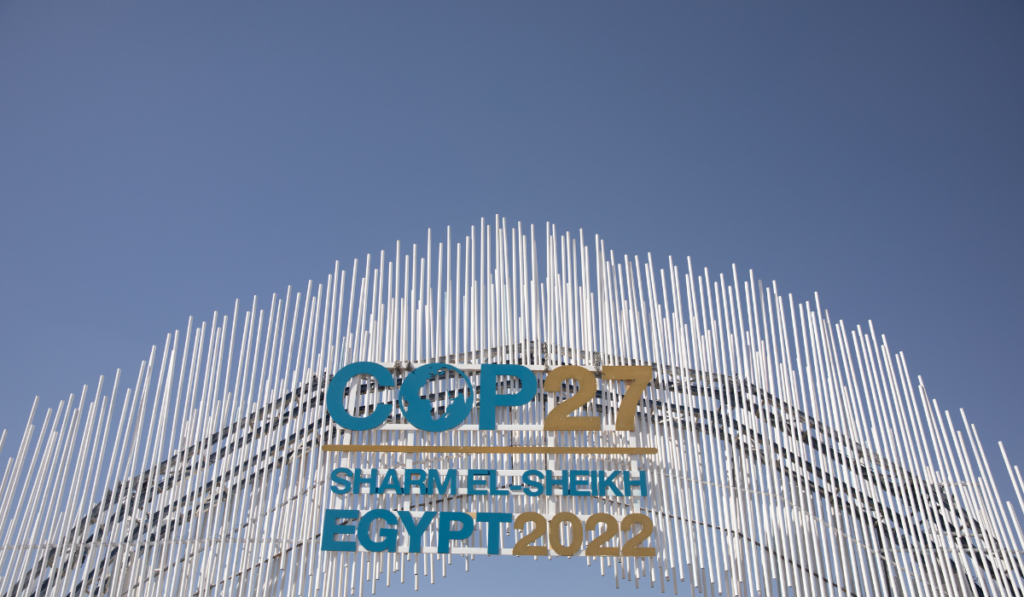We needed COP27 to deliver on human rights.
As the climate crisis escalates, so does violence against frontline environmental defenders. If climate plans do not protect people, then what’s the point? The thread between human rights and climate is inextricable. To ignore the right to a healthy and safe environment in climate decisions is to ignore the very nature of the problem, which is dangerous.
Despite the best attempts by the U.S., Egypt, and even the UNFCCC secretariat itself to sideline human rights in the conversation, civil society, frontline communities, and several Global South countries came together to ensure that it was central in the negotiations.
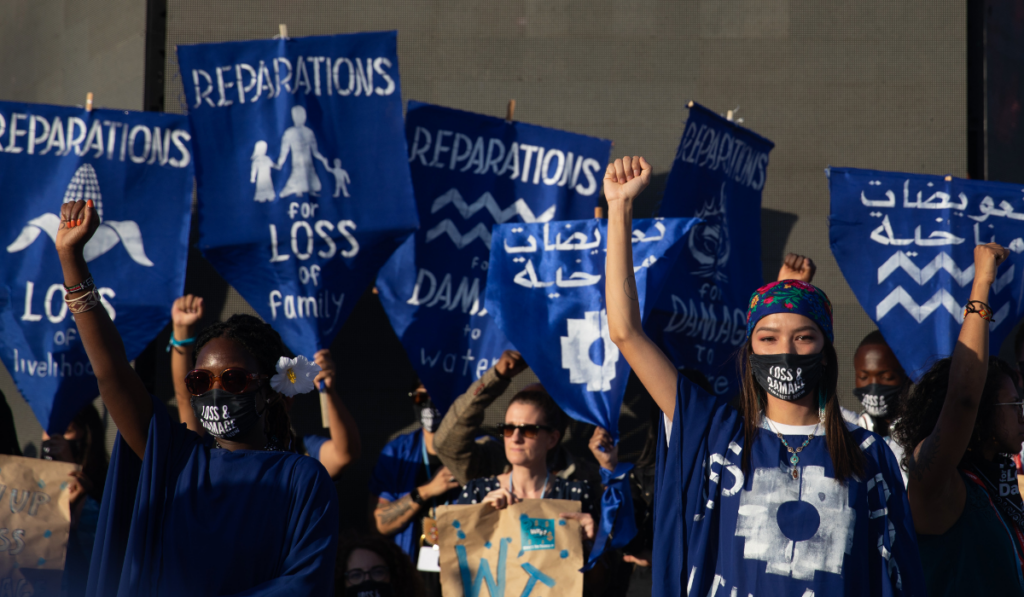
On the ground at COP27, we watched closely to see how climate decisions would protect human rights. Given that Egypt, a country currently detaining over 66,000 political prisoners, hosted COP 27, we were concerned that human rights would be entirely ignored. Civil society did not let that happen. Across issue areas, we were united around the truth that climate justice means protecting human rights. The stories of local political prisoners, escalating violence against defenders worldwide, and shrinking civic space at international negotiations served as a catalyzing force for civil society to strengthen human rights advocacy. Most of the significant actions and media moments at COP27 were deeply rooted in human rights, acknowledging local human rights issues and the need to prioritize rights in international climate agreements.
Here are some important wins and losses for human rights at COP27:
COVER DECISION
After hours-long negotiations and a big push by civil society, the approved cover decision–the final political decision coming out of the conference–acknowledged Parties’ obligations to promote and respect human rights when addressing climate change. This included the right to a healthy environment, recognized by countries at the United National Human Rights Council and the General Assembly earlier this year. However, Parties refused to fully call for the fair and equitable phase-out of fossil fuels and fossil fuel subsidies, making COP27 a major political failure. The reported increase of fossil fuel lobbyists attending COP27 shows that countries continue to fail people while protecting the interest of polluters.
Without meaningfully addressing the cause of the climate crisis, there is no chance that governments can effectively protect our right to live in a healthy environment. Parties, particularly those of the Global North, continue to shirk their responsibility to ensure a just transition away from fossil fuels.
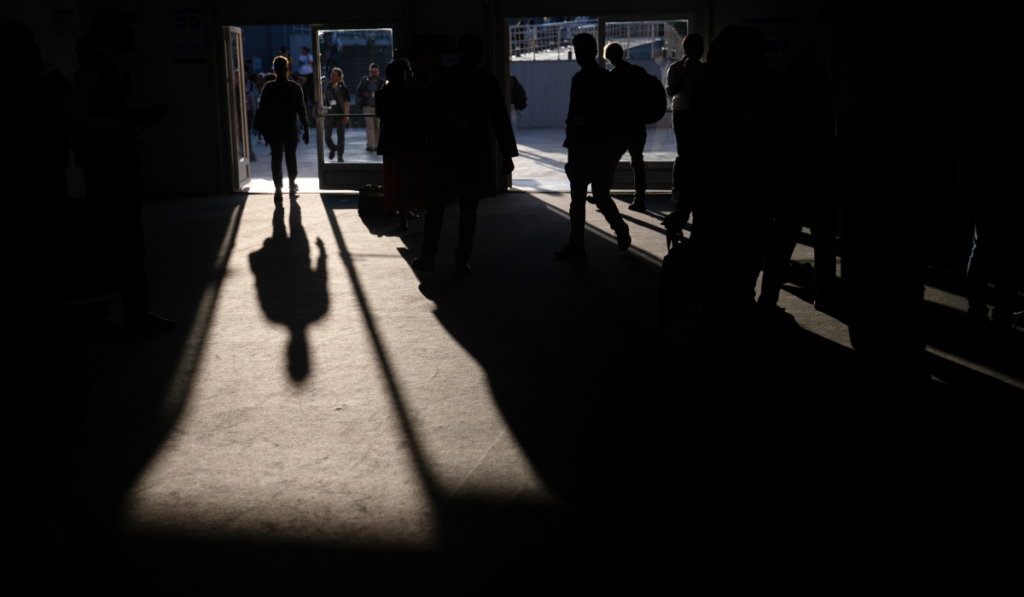
LOSS AND DAMAGE
In a breakthrough development in the last hours of COP27, negotiators finally agreed to establish a Loss and Damage fund. Climate change has led to substantial damage and irreversible loss worldwide. Some of the consequences of the climate crisis include rising violence against frontline communities, negative health impacts, displacement, food insecurity, and loss of livelihoods. These consequences are costly, and countries on the frontlines of the crisis are bearing the brunt, even though they bear the least responsible for the crisis.
If effectively operationalized, this new Loss and Damage fund will be significant for developing countries and frontline communities. Chilean Minister of Environment and co-facilitator of the negotiation, Maisa Rojas, summed it up: “[This COP27 achievement] is historic and terrible at the same time because it just states that we have failed reducing our emissions to the point that we need to address the damages and losses of climate change.”
It is unconscionable that the U.S., in particular, continued to oppose the Loss and Damage agreement decision until the last moment. On the final Friday of COP27, the Climate Action Network awarded the U.S. with the colossal fossil of COP27, as the country with the worst performance during COP27 for its continued opposition to advance the Loss and Damage negotiations, ultimately failing to fulfill the Biden’s administration’s commitment to climate justice. Over the final weekend of the conference, the U.S. agreed to support Loss and Damage– a huge reversal and an important win for human rights.
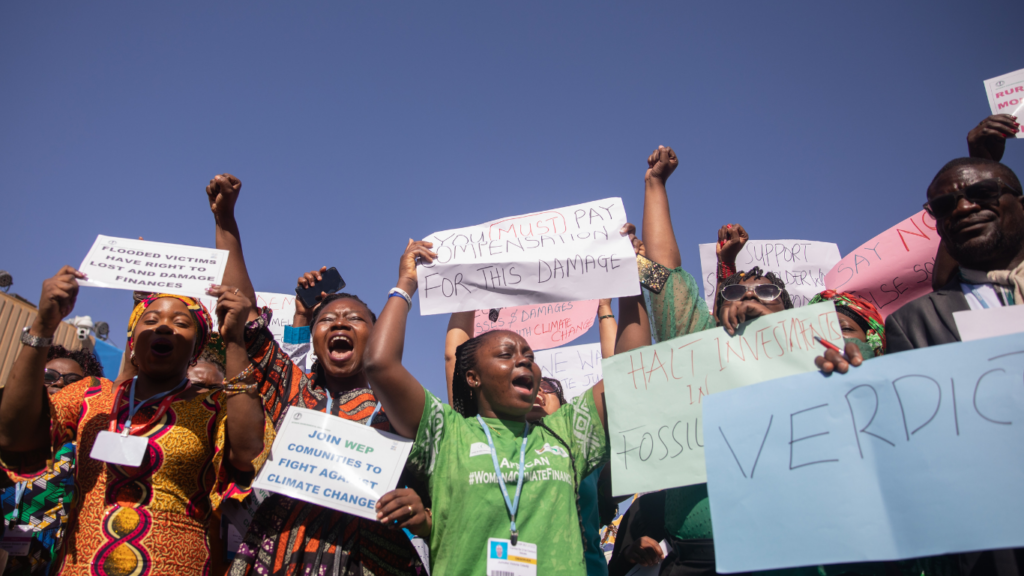
ACTION FOR CLIMATE EMPOWERMENT (ACE)
ACE is an agenda item that aims to enhance climate solutions through access to information, public participation, education, training, and public awareness in individual countries. It is the work stream under the UNFCCC that develops Article 6 of the convention. Three of these six elements–the right to access information, the right to participation, and the right to environmental education–are internationally-recognized human rights. Importantly, it is the only article in the Paris Agreement, besides the preamble, that mentions a rights-based approach to climate action. In a major regression from the Paris Agreement, Parties at COP26 adopted the Glasgow Work Program on ACE but failed to include a human rights approach or even mention human rights in the text.
At COP27, Parties adopted a four-year action plan under ACE. After Glasgow, civil society increased pressure, calling on Parties to operationalize the human rights framework proposed by ACE by including specific rights-related activities. Civil society also advocated for the action plan to recognize and address the barriers to participation and access to information that many environmental defenders face. At COP27, Parties adopted the action plan with no mention or recognition of the role of environmental defenders. However, the adopted action plan includes a reference for Parties to integrate ACE elements into climate change policies, taking into account their human rights obligations. The action plan also calls on Parties to hold a specific session to discuss the role of children, youth, and Indigenous peoples in accelerating ACE implementation. We’re hopeful that this session makes the situation of Indigenous environmental defenders more visible.
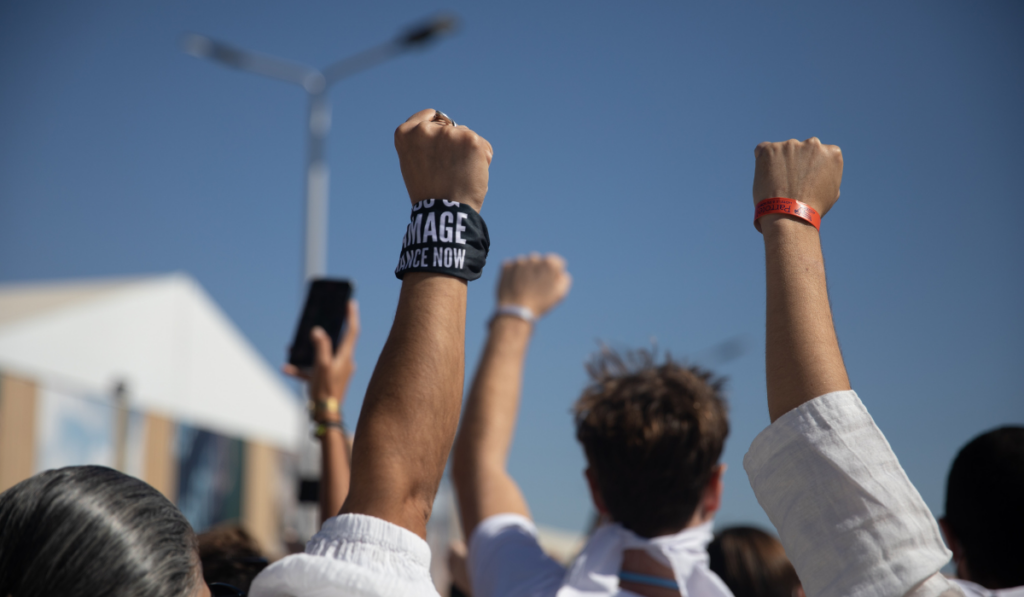
GLOBAL STOCKTAKE (GST)
Parties conducted the second dialogue of the GST of the Paris Agreement. The GST is a process for “taking stock” of the implementation of the Paris Agreement to make sure that countries can achieve the goals of the treaty.
Civil society has advocated for the GST to explicitly assess how Parties’ National Determined Contributions (NDCs) and all other climate actions have respected, protected, and promoted human rights, including the rights of Indigenous peoples and the rights of environmental defenders. Including a human rights discussion in the GST will better inform future NDCs, adaptation plans, and all climate action. At COP27, little progress was made to integrate the human rights impacts of climate change into the GST dialogues. Although we saw advances with a more open and accessible process that included greater participation from civil society representatives (but also fossil fuel lobbyists), only one of the dozens of experts officially invited by the co-facilitators of the process addressed these concerns.
During COP27, civil society called for the report from this session to include specific mention of the human rights impacts of the climate crisis. For example, when discussing mitigation and fossil fuels, Parties must also address the links between the growing repression and violence against environmental defenders and fossil fuel projects.
Parties must make sure that the outcomes of the GST adopted at COP28 include specific guidance on how they should increase their ambition to fulfill their human rights obligations. Next year’s GST outcomes should also include information on developing the next round of NDCs by ensuring the promotion, protection, and respect of human rights. We know that Parties won’t be able to fulfill the goals of the Paris Agreement without protecting those at the frontlines of the crisis.
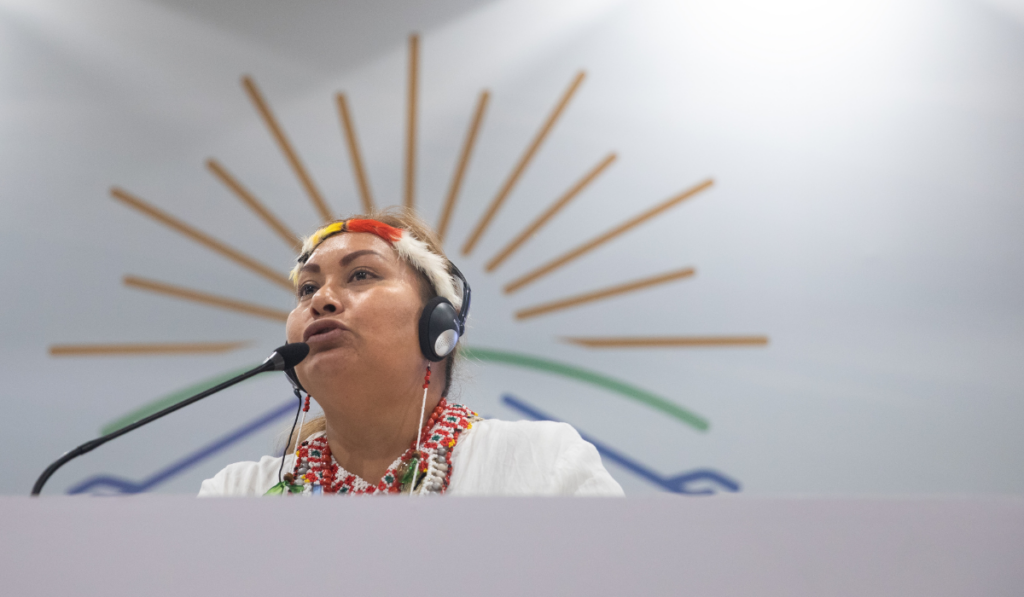
RECOGNITION AND PROTECTION OF ENVIRONMENTAL HUMAN RIGHTS DEFENDERS
Ahead of COP27, EarthRights and partners released a set of recommendations for policymakers attending the climate conference in Egypt, calling on them to take meaningful steps to protect those on the frontlines of the climate crisis and to enable diverse, safe, and effective participation of civil society observers during UNFCCC COPs. Environmental and land defenders play a critical role in mitigating the effects of climate change, yet they’re often subjected to violence, harassment, intimidation, and criminalization for speaking out against land dispossession and climate abuses.
With the closed civic space in Egypt and the ongoing campaign to release political prisoners in the country, it was even more important to raise our voices to demand that climate negotiations recognize and protect the role of defenders in achieving the objectives of the Paris Agreement.
At COP27, civil society intensified the call for Parties to protect defenders and ensure an enabling environment for climate advocacy. EarthRights and partners hosted a side event where women environmental defenders and climate advocates from all regions of the world shared their experiences about growing violence against defenders and called on Parties to act for their protection.
The link between environmental defenders’ situation and climate action’s effectiveness was also raised in a side event at the Chilean Pavillion. EarthRights and partners hosted a conversation with government officials, civil society representatives, and defenders from the region to discuss how the landmark Escazu Agreement in Latin America and the Caribbean recognizes the role of environmental defenders in building a just transition and the need to protect them from further harm.
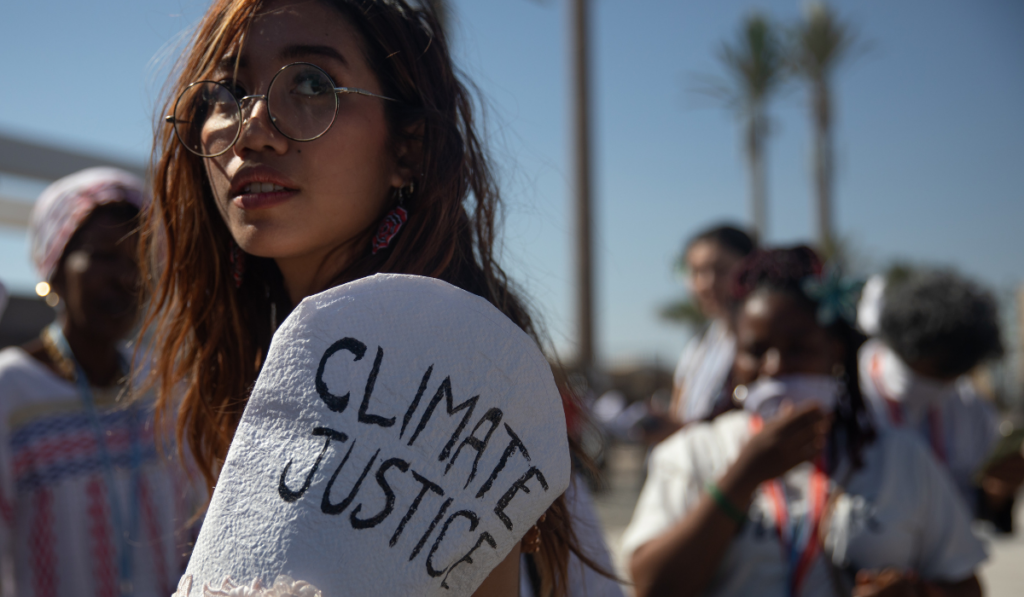
FINAL THOUGHTS
“Human rights have always been a side issue at these international climate agreements.” We heard variations of this sentiment throughout COP27 from civil society, UN officials, and even government delegates. And it’s true. Human rights are treated as an afterthought compared to the numbers that inform global reports of scientific climate change. It is as if the number of environmental defenders killed in the last ten years, 1,733, is not as important as the degree increases in temperature or the percentage of land lost to rising seas.
The truth is that human rights impacts cannot be separated from the causes of the climate crisis. Again and again, we see that violence against defenders increases as the climate crisis escalates. This situation is also concerning because next year’s UNFCCC COP is set to take place in the United Arab Emirates, a country with a closed civic space where public civil society advocacy is almost non-existent and where we anticipate that fossil fuel lobbyists will again peddle fake solutions that harm people and their rights.
At COP27, we saw that when civil society unites to protect people and global rights, there are major shifts in final agreements. But we can’t do it alone. We’ll only meaningfully solve this crisis if governments and the UNFCCC secretariat prioritize the protection of human rights and those that are defending this world for generations to come.
Natalia Gomez is the Climate Change Policy Advisor at EarthRights. Audrey Schreiber is the Digital Organizer at EarthRights.
